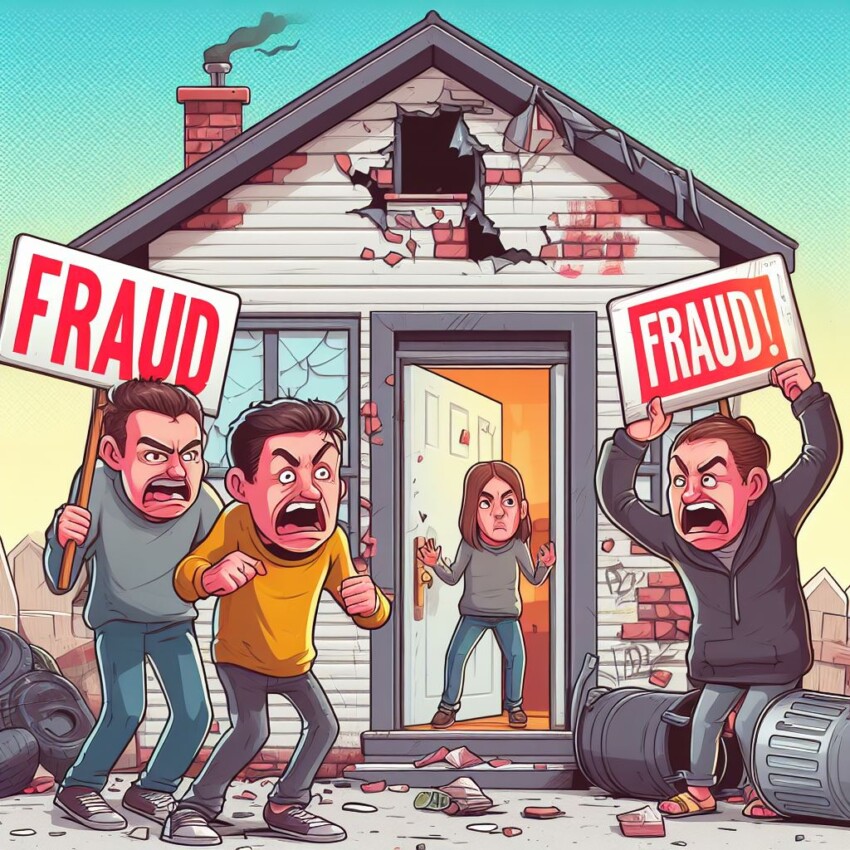Have you ever found yourself wondering what to do when your Airbnb guest refuses to respect your space? You’re not alone. As a host in Australia, it’s essential to handle such situations swiftly and assertively.
This guide will arm you with the tools and knowledge to evict a bad guest with minimal fuss. You’ll learn how to communicate effectively, document any issues, and navigate Airbnb’s policies. Plus, you’ll understand when it’s time to involve the authorities and how to manage the aftermath.
Let’s get started on safeguarding your property and ensuring your hosting experience remains a positive one.
Key Takeaways
- Familiarize yourself with Airbnb’s policies and consequences for guest behavior, including warnings, account suspension, and potential bans from hosting or booking for up to five years.
- Maintain clear and professional communication with the guest, addressing the specific issues and house rules that have been violated, and emphasizing the importance of resolving the matter amicably.
- Document incidents of guest misconduct meticulously, including photos, recordings, and videos, to provide indisputable evidence of wrongdoings and support any claims or complaints.
- Understand and adhere to local laws and regulations governing Airbnb evictions in different Australian states, and utilize the Resolution Center and legal avenues, such as the Victorian Civil and Administrative Tribunal or the New South Wales Code of Conduct, to resolve issues and take necessary actions while minimizing liabilities.
Understanding Airbnb Policies

You need to be well-versed with Airbnb’s policies regarding guest behavior to effectively manage your rental.
Guests who breach these terms face specific consequences, which can range from warnings to account suspension.
It’s critical to understand these repercussions to uphold your rights as a host and maintain your property’s integrity.
Airbnb’s policy on guest behavior
Airbnb’s guest conduct policy sets firm boundaries you must adhere to, including off-limits areas, the number of occupants, and acceptable behavior during your stay.
As an Airbnb guest, you’re bound by house rules that the Airbnb host specifies. Violations of these guidelines or engaging in misconduct can lead to severe repercussions.
Airbnb’s policy on guest behavior is stringent; breaches may result in your removal from the platform and a ban from hosting or booking a short-term rental accommodation (STRA) for up to five years.
Compliance is non-negotiable; non-adherence results in immediate termination of your Airbnb agreements and access.
Consequences for guests who violate these policies
While staying at an Airbnb, if you breach the host’s house rules or engage in misconduct, you’ll face strict penalties, including the possibility of eviction and being banned from the platform. Horror stories of unruly behavior at short-term rentals underscore the gravity of such transgressions.
As a bad Airbnb guest, you’re not just at risk of immediate eviction; you’re also potentially liable for compensation and legal costs. In Victoria, the Tribunal can issue fines, while in New South Wales, violating the Code of Conduct may lead to a five-year ban from booking or hosting. Being listed on the Exclusion Register spells severe consequences, deterring misconduct and ensuring the integrity of the Airbnb community.
Communicating With Your Guest

When addressing issues with your Airbnb guest, it’s crucial to be direct yet professional. Outline the specific breach of house rules clearly and concisely. You must maintain a tone of respect throughout the conversation to prevent escalation and preserve the possibility of a peaceful resolution.
Should the situation not improve, promptly escalate the matter to Airbnb Support. Provide them with detailed documentation of all communications.
How to address the issue with your guest
Address your guest’s behavior directly and promptly, ensuring you clearly outline the specific issues and house rules that have been violated. It’s critical to maintain an analytical and authoritative tone throughout this process.
When you contact your guest:
- Make sure to document the conversation for future reference.
- Highlight the importance of resolving the matter amicably to avoid further action.
- Remind them that Airbnb stays are based on mutual respect and adherence to agreed-upon rules.
- Inform them that, without notice, their continued disregard for house rules could lead to eviction.
If the situation doesn’t improve after your intervention, it’s time to get Airbnb involved. Having contacted Airbnb, you’ll benefit from their five years of experience in resolving such disputes.
Importance of maintaining professionalism
In dealing with a challenging Airbnb guest, it’s essential to maintain professionalism, as your interaction sets the tone for the resolution process. Clear, respectful communication is key to addressing violations or conflicts; it can de-escalate tension and preserve your reputation as a host.
Ensure that all exchanges are documented—through photographs, recordings, or videos—to provide an accountable record. If involving authorities becomes necessary, approach the situation with calm authority to guarantee a safe and lawful eviction.
Documenting the Issues

Documentation is key; you’ll need to meticulously record all incidents of guest misconduct with photos, recordings, and videos as evidence. This step is critical in providing an indisputable account of any wrongdoings and is invaluable when liaising with Airbnb or NSW Fair Trading. Ensure your evidence is concrete and accurately reflects the situation, as this will form the foundation of your case should you need to escalate the matter.
When documenting, consider the following:
- Photographic Evidence: Capture clear images of any damage or policy violations.
- Audio/Video Recordings: Use recordings to support claims of excessive noise or disruptive behavior.
- Time-stamped Notes: Keep a detailed log of events, noting the date and time of each incident.
- Communication Records: Save all correspondence with the guest that pertains to the issues at hand.
Your analytical approach to gathering evidence will bolster your position and demonstrate a methodical and professional handling of the situation.
Seeking Airbnb Support (When and how to report the issue to Airbnb)

When you’re facing a difficult situation with a guest, it’s crucial to report the issue to Airbnb immediately for support and guidance. As an analytical step, you must understand the platform’s procedures and provide a detailed account of the incident, ensuring precision in your communication. Airbnb’s support system is designed to mediate and resolve conflicts, but it is vital to approach them with a clear and authoritative stance on your rights as a host.
Here is a structured approach to seeking support from Airbnb:
| Step | Action | Expected Outcome |
| 1 | Contact Airbnb Support | Receive advice and assistance |
| 2 | Provide evidence of issues | Support for your claims |
| 3 | Request intervention | Airbnb mediates the situation |
| 4 | Await Airbnb’s call back | Confirmation of eviction rights |
| 5 | Follow Airbnb’s guidance | Resolution and potential compensation |
If you encounter unauthorized guests or rule violations, inform Airbnb and request extra costs if necessary. Be aware that their response time can be up to 2.5 hours, and they may need to contact the guest for eviction. Afterward, consider Airbnb’s updates and decide whether to offer a refund. Your analytical approach will ensure a precise and fair resolution.
Utilizing the Resolution Center
Addressing a problematic Airbnb guest in Australia, you’ll find the Resolution Center an essential tool for initiating the eviction process. It serves as your first point of contact with Airbnb to detail and document any issues arising during a guest’s stay. Your approach should be methodical and grounded in evidence to support your case.
When you’re ready to use the Resolution Center, keep in mind the following steps:
- Document Everything: Before you reach out, ensure you have all evidence of the guest’s misconduct, such as messages, photographs, or videos.
- Be Clear and Concise: In your communication with Airbnb, describe the situation factually, avoiding emotional language that might cloud the issue.
- Know the Rules: Familiarize yourself with Airbnb’s policies and terms of service to ensure your request for eviction aligns with their guidelines.
- Act Promptly: Time is critical. Initiate the resolution request as soon as the problem arises to prevent further issues.
Legal Aspects of Evicting an Airbnb Guest in Australia

You must understand the local laws that govern Airbnb evictions, as they differ across Australian states.
The legal process begins with adherence to your state’s specific regulations, such as those enforced by the Victorian Civil and Administrative Tribunal or the New South Wales Code of Conduct.
It’s imperative to act within these frameworks to legally remove a guest while minimizing potential liabilities.
Understanding local laws and regulations in Australia
As an Airbnb host in Australia, it’s crucial that you understand the legalities involved in evicting a guest to ensure you’re compliant with local regulations.
- Prevent Unruly Gatherings: You’re responsible for stopping parties that may cause disturbances, with potential joint liability for damages.
- Fines and Compensation: VCAT can impose fines for breaches, and residents may claim up to $2000 for disrupted peace.
- Code of Conduct Compliance: In NSW, adherence to the Short-term Rental Accommodation Industry Code is enforced, impacting hosts and guests alike.
- Exclusion Register: Non-compliance could lead to a five-year ban from the industry and removal from Airbnb’s platform.
Always stay informed and act within the legal frameworks to manage your property effectively and mitigate risks associated with hosting.
Legal process of Airbnb eviction
When evicting a bad Airbnb guest in Australia, it’s crucial to understand the legal steps involved to ensure the process is carried out correctly and within your rights as a host.
Engage trained security services to professionally handle the situation and document it comprehensively with photos and recordings.
If the guest remains uncooperative, involving the police is a necessary step to guarantee their departure.
Remember, the guest is legally responsible for covering eviction costs as stated in the agreement.
Additionally, for severe disturbances, the Victorian Civil and Administrative Tribunal can impose fines and temporary bans on property rentals.
Be aware of the Exclusion Register managed by NSW Fair Trading, which lists individuals barred from participation in the short-term rental market due to non-compliance.
Issuing a Formal Notice
Before taking any drastic steps, you’ll need to issue a formal notice to the guest, clearly stating the reasons for their impending eviction. This notice serves as a critical document, outlining your intentions and providing a clear justification for your actions. Ensure that the notice is delivered in a manner that leaves no ambiguity about your expectations.
When crafting and issuing this formal notice, consider including:
- Specific details of the violation that has led to this decision.
- A clear deadline for when the guest must vacate the property.
- The consequences of failing to comply with the notice, such as involving the police or security services.
- Information about any evidence, such as photos or recordings, that supports your decision to evict.
Remember, this notice should be unambiguous and reflect the seriousness of the situation. If the guest doesn’t adhere to the notice, be prepared to escalate the matter. Have the contact information for security services on hand (0467 341 387) and be ready to involve them if necessary.
It’s critical to remain firm and follow through with your outlined course of action to resolve the issue effectively and within legal boundaries.
When and how to involve local law enforcement for Airbnb Evictions in Australia if Necessary

If you’ve issued a formal notice and the guest still refuses to vacate, it’s time to involve local law enforcement to ensure a lawful eviction process. Remember, involving the police should be a last resort, but if the situation escalates, you must act decisively to protect your property and maintain the peace.
Here’s an analytical table that lays out the potential consequences and actions for unruly Airbnb guests:
| Consequence for Guests | Required Action |
| Legal liability for costs | Enforce payment of eviction fees |
| Unruly parties and disturbances | Seek police intervention |
| Compensation for damages | File claims for property damage |
| Fines for breaches of peace | Report to VCAT for adjudication |
Managing Post-Eviction Process
Once you’ve successfully evicted a troublesome Airbnb guest, it’s critical to assess any property damage promptly.
You’ll need to document the state of your property with photographic evidence and submit a claim through Airbnb’s Resolution Center.
Moreover, leaving a factual and objective review of the guest deters future hosts from encountering similar issues.
Handling property damage
After you’ve successfully evicted a problematic Airbnb guest, it’s crucial to assess and document any property damage immediately to manage the post-eviction process effectively. Your attention to detail here will lay the groundwork for any claims or legal actions needed to recoup losses.
- Conduct a thorough walk-through of the premises, noting any damages or alterations.
- Utilize security footage and photographic evidence to support your claims.
- Ensure all documentation is date-stamped and includes detailed descriptions.
- Secure witness statements if available, to corroborate the extent of the damage.
How to review a bad guest
You’ll need to craft a balanced and factual review of your experience, detailing every incident with the guest you’ve had to evict. This review should be analytical, focusing on the specific behaviors that led to the eviction, and avoid emotional language. Remember, this is not only about expressing your dissatisfaction but also about informing other hosts.
Here’s a structured way to present your review:
| Incident Type | Description |
| Damage | Detail any property damage caused by the guest. |
| Rules Violation | List instances where house rules were disregarded. |
| Unauthorized Guests | Note any unauthorized visitors during the stay. |
Maintain precision in your report to ensure that Airbnb and future hosts have a clear understanding of the situation.
Preventing Future Incidents

To prevent future incidents with Airbnb guests, it’s essential to set clear house rules and confirm that your guests understand them before their stay begins. Your objective is to create an environment of mutual respect and clarity, which will serve as the foundation for a smooth hosting experience. This reduces the likelihood of disputes and the need for drastic measures such as eviction.
Consider taking the following steps to safeguard your property and hosting reputation:
- Outline House Rules: Provide a detailed list of do’s and don’ts, emphasizing the consequences of violations.
- Install CCTV: Set up cameras in common areas and entrances (mindful of privacy laws) to deter misconduct and document evidence if needed.
- Enhanced Security: Add locks on private doors and limit access to sensitive areas to prevent unauthorized use.
- Transparent Communication: Engage in open dialogue with guests about expectations and address concerns promptly.
Frequently Asked Questions
How Do I Get Rid of a Bad Guest on Airbnb?
You’re navigating murky waters when a guest turns sour. Don’t flinch; document the chaos, alert Airbnb, and stand firm on your house rules. It’s vital to cut the anchor swiftly and surely.
What Can You Do if an Airbnb Guest Refuses to Leave?
If an Airbnb guest won’t leave, contact Airbnb Support immediately. Provide evidence, and they’ll mediate. You may need to involve the police if the guest still refuses to vacate the property.
Can Police Remove People From Airbnb?
Yes, you can involve the police to remove an uncooperative Airbnb guest if they’re violating the law or your agreement. It’s a last resort, but it ensures your property rights are upheld.
How Do You Deal With an Unhappy Guest on Airbnb?
Navigating the stormy waters of guest dissatisfaction, you’ll need to listen attentively, respond promptly, and offer practical solutions, ensuring your response is both empathetic and firm to maintain the integrity of your Airbnb service.
Conclusion
In wrapping up, you’ve now navigated the choppy waters of guest turnover with finesse. By steering through Airbnb’s guidelines and local laws with a steady hand, you’ve ensured your haven remains just that.
Remember, a stitch in time saves nine—address issues promptly to avoid future turbulence.
Now, with your space reclaimed and harmony restored, you’re ready to welcome new voyagers to your serene port, armed with wisdom for smoother sailing ahead.































